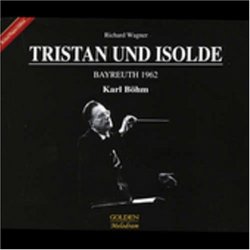| All Artists: Richard [Classical] Wagner, Karl Böhm, Bayreuth Festival Orchestra, Birgit Nilsson, Eberhard Waechter, Eberhard Wächter, Georg Paskuda, Gerhard Stolze, Hans Hanno Daum, Josef Greindl, Kerstin Meyer, Niels Moller, Wolfgang Windgassen Title: Wagner: Tristan und Isolde Members Wishing: 0 Total Copies: 0 Label: Melodram Original Release Date: 1/1/2005 Re-Release Date: 6/28/2005 Genre: Classical Styles: Opera & Classical Vocal, Historical Periods, Modern, 20th, & 21st Century Number of Discs: 3 SwapaCD Credits: 3 UPC: 608974110734 |
Search - Richard [Classical] Wagner, Karl Böhm, Bayreuth Festival Orchestra :: Wagner: Tristan und Isolde
 | Richard [Classical] Wagner, Karl Böhm, Bayreuth Festival Orchestra Wagner: Tristan und Isolde Genre: Classical |
Larger Image |
CD Details |
CD ReviewsBohm's best Tristan The Cultural Observer | 08/23/2006 (5 out of 5 stars) "I would like to quote Robert Levine's excellent review of this recording on classicstoday.com:
"Listeners familiar with the 1966 recording of this opera, also from Bayreuth and featuring three of the same main players--Nilsson, Windgassen, and Waechter--will have an idea what to expect from this performance and will welcome it. Karl Böhm's leadership is unyieldingly tense and quick. Isolde's anger, even in the mouth of a lesser singer, would be palpable with such quick and forwardly-placed delivery, but Nilsson, more-so than in '66 (and certainly more than for Solti in '60), is a woman possessed--by rages, revenge, love, sadness, resignation. She's a powerhouse vocally, singing with her usual laser-like tone, but also with more attention to quiet shading than in any other recorded performance. Wow! And this is Windgassen's best recorded Tristan, hands down. By '66 he had begun to sing throatily and with some tightening of the tone above F; here he just keeps going, like the Energizer bunny, ranting his way through his third-act delirium in an almost terrifying manner. Perhaps because Windgassen is younger and more secure, the love duet is truly rapturous in this performance; there is something slightly overwrought about it in '66 that is happily lacking here. Eberhard Waechter also seems better than he would be four years later. I recall him being a brawny Kurwenal, but here he's very in-the-moment, particularly in the last act, comforting and supporting Tristan. The under-recorded Kerstin Meyer is Brangaene, and what a fine singing actress she is! With impeccable diction and a bright tone, she more than keeps up with Böhm's nervous energy and Isolde's tantrums. Josef Greindl's Marke is a true drawback; wobbly and ugly, he has little stature and is hard to listen to. Gerhard Stolze's Shepherd is well sung and acted--a nuanced performance--and the rest of the cast is fine. In the '66 performance, Böhm's enthusiasm occasionally allowed the performance to go nuts: the last five minutes of the first act is practically a free-for-all. Here it is still lean and on edge, but precise. It's a pity about Greindl, but you should buy this anyway. The sound is very good (I believe the Decca team recorded it), with horns blaring but not distorted--although, like the '66 recording, it has few gentle, plush moments. If you like your Tristan fat-free and thrilling, this is it." --Robert Levine That said and done, what I had initially thought about Bohm's Tristan is dispelled here. Nilsson's Isolde is also an excellent interpretation of the part, combining more passion in her singing than in the DG recording years later. Windgassen in 1962 was younger, and hence fresher of voice, more youthful, and more vigorous in all acts. My only regrets about this recording are the King Marke and the Brangane. Greindl was no Talvela, and Meyer is certainly no Ludwig, but all in all, this recording holds up the great standards of Bayreuth that Wieland Wagner held up during his time there as artistic director." |
